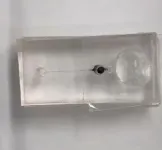(Press-News.org) Philadelphia, February 26, 2024 – A passionate plea for the re-establishment of Canada's health coalition focused on hypertension prevention and control appears as an editorial in the Canadian Journal of Cardiology, published by Elsevier. "We need a national hypertension control program to prevent death and disability," according to prominent healthcare leaders.
Lead author of the editorial Norm R.C. Campbell, MD, Department of Medicine, University of Calgary, explains, "Hypertension is a leading cause of death and disability in Canada; globally it causes about one in five deaths (19.2%). However, it is possible to reduce that markedly. Throughout my career in healthcare, I have worked on controlling our population's hypertension. What was achieved in Canada was highly unique; Canada used to be the most successful country in controlling hypertension by a large margin and one of the best at prevention."
The editorial describes the pivotal role Canadian coalitions had in the prevention and control of hypertension. In Canada, the delivery of healthcare is a provincial and territorial responsibility, whereas the federal government sets and administers national standards for the healthcare system through the Canada Health Act as well as many nutrition policies. Given the burden of disease associated with increased blood pressure, the Canadian federal and provincial governments released a hypertension strategy in 1986 calling for a coalition of governmental and non-governmental organizations to oversee strategy implementation.
Professor Campbell says, "In recent years, I have seen the Canadian hypertension control coalition and program fall apart while other countries are building much better national programs to control hypertension. As a result, hypertension control in Canada has been declining for the last decade. Hypertension prevention and control on a population scale are proven methods to prevent death and disability as well as reducing healthcare costs. We need to reestablish our national program to save lives."
Ross Tsuyuki, PharmD, President, Hypertension Canada, concurs with Professor Campbell's assessment, and says, "Hypertension Canada is highly concerned about declining control of blood pressure leading to increased death and disability in Canadians. Canada has become complacent. Hypertension Canada is committed to helping reestablish a coalition to bring the stakeholders, being healthcare providers and governments, to the table to address this problem."
Patrice Lindsay, RN, PhD, Lead, PWLE Engagement and Stroke Strategy at the Heart and Stroke Foundation of Canada, adds, “Heart & Stroke recognizes high blood pressure as the leading risk factor for stroke and a major risk factor for heart disease. We strongly support initiatives that will lead to measurable increases in diagnosis, treatment, and control of high blood pressure and result in reductions in death and hospitalization from cardiovascular disease. These measures will improve outcomes and quality of life for individuals affected by high blood pressure."
Prevention of high blood pressure can occur at different levels.
Via various public health interventions, such as promoting healthy diets, regular physical activity, reducing alcohol consumption, and maintaining a healthy body weight and composition.
Via clinical interventions, such as advising a healthy lifestyle and drug treatments.
Professor Campbell: "Healthy lifestyles are hard for people to implement in our unhealthy environments; they take time and lots of support. Drug treatment is highly effective and fast and can save money or be cost-effective. Sadly, our clinical interventions are in decline."
The global model to prevent non-communicable disease (NCD) – that account for about 90% of deaths and 85% of disability in Canada – and strengthen primary care is the World Health Organization (WHO)'s HEARTS initiative. HEARTS uses hypertension control as the “entry point” for NCD prevention and control in primary care.
Professor Campbell: "While many public health professionals focus clinical interventions on infections like Covid-19, influenza, and the RS virus, the real issue impacting death and disability in Canada is prevention and control of NCDs. HEARTS is an established global model for Canada to use to rebuild primary care to reduce death rates and prevent NCDs."
Professor Campbell concludes, "Winston Churchill stated, ’never let a good crisis go to waste.’ In Canada, we have an opportunity to build a much stronger collaborative federated health system focused on global best practices to prevent and control our major causes of death and disability, increasing quality of life, and saving health costs. It does not require much innovation or intellect but does require a strong ability to collaborate with the current global best practice being WHO HEARTS."
END
Healthcare leaders plea to reinstate the Canadian hypertension control program to prevent death and disability
An editorial published in the Canadian Journal of Cardiology calls for the reestablishment of the national hypertension coalition
2024-02-26
ELSE PRESS RELEASES FROM THIS DATE:
Drug limits dangerous reactions to allergy-triggering foods, Stanford Medicine-led study of kids finds
2024-02-25
A drug can make life safer for children with food allergies by preventing dangerous allergic responses to small quantities of allergy-triggering foods, according to a new study led by scientists at the Stanford School of Medicine.
The research will be published Feb. 25 in the New England Journal of Medicine. The findings suggest that regular use of the drug, omalizumab, could protect people from severe allergic responses, such as difficulty breathing, if they accidentally eat a small amount of a food they are allergic to.
“I’m excited that we have a promising ...
Measuring the properties of light: Scientists realise new method for determining quantum states
2024-02-25
Scientists at Paderborn University have used a new method to determine the characteristics of optical, i.e. light-based, quantum states. For the first time, they are using certain photon detectors - devices that can detect individual light particles - for so-called homodyne detection. The ability to characterise optical quantum states makes the method an essential tool for quantum information processing. Precise knowledge of the characteristics is important for use in quantum computers, for example. The results have now been published in the specialist journal "Optica Quantum".
"Homodyne detection is a method frequently ...
For faster access to gene and cell therapies in Europe
2024-02-25
Gene and cell therapies are among the most important innovations in the healthcare sector. And they reflect advances in science and technology. They have the potential to radically reshape the treatment of cancer, autoimmune diseases, neurodegenerative disorders, and many rare genetic conditions. But the path to approval and clinical use of these products is long and often fraught with difficulty.
That was the reason the European University Hospital Alliance (EUHA) founded the European Center for Cell and Gene Cancer Therapies (EUCCAT) four years ago. The center’s aim is to facilitate the clinical use of ATMPs developed at higher education institutions and further ...
Scientists deliver portable total chemical analysis without pumps and tubes
2024-02-24
Tokyo, Japan – Researchers from Tokyo Metropolitan University have engineered a new micro total analysis system that quantifies a target chemical in a microfluidic chip without pumps, tubes, and expensive detectors. The compound reacts with other chemicals to produce a gas, pushing ink in a connected chamber along a channel. Built-in light detectors help measure the flow speed, allowing measurement of the original chemical. The portability of the new device enables bedside, quantitative clinical analysis.
Microfluidics is a revolutionary technology delivering precision chemistry with vastly less chemicals. ...
A very long, winding road: Developing novel therapeutics for metastatic tumors
2024-02-23
“Given that the MET inhibitor capmatinib caused a remarkable response in Dr. Blagosklonny, a pertinent question remains as to why he was not treated with ‘preemptive drug combinations’ [...]”
BUFFALO, NY- February 23, 2024 – A new editorial paper was published in Oncoscience (Volume 11) on February 9, 2024, entitled, “A very long and winding road: developing novel therapeutics for metastatic tumors.”
In this editorial, researcher Paul Dent from the Department of Biochemistry and Molecular Biology at Virginia Commonwealth University writes that tumors that ...
Unlocking health: How In Our DNA SC is pioneering genetic screening for South Carolinians
2024-02-23
Physicians and scientists have known for many years that our genetics not only shape our physical features like our smiles but also our risk for developing certain diseases.
The problem? Most people don’t know if they have inherited these genetic risk factors for disease.
In Our DNA SC, a statewide genomic screening program launched by the Medical University of South Carolina (MUSC), aims to change that.
The program, the first and only program of its kind in the Southeast, is led by Caitlin G. Allen, Ph.D., a ...
Down Under Demo: ONR touts additive manufacturing tech at Australian event
2024-02-23
ARLINGTON, Va.—The Office of Naval Research (ONR) — and its international arm, ONR Global — participated in the recent Autonomous Warrior 2023 (AW23) exercise, located at HMAS Creswell in Jervis Bay, Australia.
AW23 brought together Australian military allies, as well as industry and international partners, to demonstrate various technologies designed to help the Royal Australian Navy strengthen its capabilities in the area of undersea warfare — including uncrewed (also called unmanned) and autonomous systems, artificial intelligence and machine learning, and logistics, ...
Study shows benralizumab is effective as a treatment for eosinophilic granulomatosis with polyangiitis, a rare form of vasculitis
2024-02-23
Researchers have shown that the drug benralizumab is as effective and safe as mepolizumab for inducing remission in patients with eosinophilic granulomatosis with polyangiitis (EGPA) according to a study published today in The New England Journal of Medicine. The results of the non-inferiority study were presented at the American Academy of Allergy, Asthma & Immunology annual meeting in Washington, D.C., by Michael Wechsler, M.D., pulmonologist, director of The Cohen Family Asthma Institute at National Jewish Health and lead author of the paper.
EGPA is a rare form of vasculitis, characterized by inflammation in the small blood vessels. This inflammation ...
Researchers identify new choice of therapy for rare autoimmune disease EGPA
2024-02-23
An international team, including researchers from McMaster University and St. Joseph’s Healthcare Hamilton, has identified a new therapeutic for patients with a rare autoimmune disease called eosinophilic granulomatosis with polyangiitis (EGPA). A biologic drug called benralizumab has been shown to be non-inferior to mepolizumab in the treatment of EGPA.
In a clinical trial involving 140 patients with the rare disease, researchers directly compared two biologic drugs, mepolizumab and benralizumab. Patients received monthly subcutaneous injections of either 300 mg of mepolizumab or 30 mg of benralizumab for one year. The findings of the trial were published on Feb. 23, 2024, in the New ...
Powering nitrogenases
2024-02-23
Nitrogenases are considered promising candidates for the sustainable enzymatic production of ammonia and carbon compounds. Unfortunately, one bottleneck in this complex process, the supply of electrons to the enzymes, has remained a mystery until now. Now a team at the Max Planck Institute for Terrestrial Microbiology in Marburg has discovered two essential electron carriers which play a key role in determining the performance of iron (Fe) nitrogenase, thus opening up new possibilities for elucidating and maximizing nitrogenase's potential.
Nitrogenases are catalysts for several industrially relevant ...
LAST 30 PRESS RELEASES:
Nutrient uptake gets to the root of roots
Aspirin not a quick fix for preventing bowel cancer
HPV vaccination provides “sustained protection” against cervical cancer
Many post-authorization studies fail to comply with public disclosure rules
GLP-1 drugs combined with healthy lifestyle habits linked with reduced cardiovascular risk among diabetes patients
Solved: New analysis of Apollo Moon samples finally settles debate about lunar magnetic field
University of Birmingham to host national computing center
Play nicely: Children who are not friends connect better through play when given a goal
Surviving the extreme temperatures of the climate crisis calls for a revolution in home and building design
The wild can be ‘death trap’ for rescued animals
New research: Nighttime road traffic noise stresses the heart and blood vessels
Meningococcal B vaccination does not reduce gonorrhoea, trial results show
AAO-HNSF awarded grant to advance age-friendly care in otolaryngology through national initiative
Eight years running: Newsweek names Mayo Clinic ‘World’s Best Hospital’
Coffee waste turned into clean air solution: researchers develop sustainable catalyst to remove toxic hydrogen sulfide
Scientists uncover how engineered biochar and microbes work together to boost plant-based cleanup of cadmium-polluted soils
Engineered biochar could unlock more effective and scalable solutions for soil and water pollution
Differing immune responses in infants may explain increased severity of RSV over SARS-CoV-2
The invisible hand of climate change: How extreme heat dictates who is born
Surprising culprit leads to chronic rejection of transplanted lungs, hearts
Study explains how ketogenic diets prevent seizures
New approach to qualifying nuclear reactor components rolling out this year
U.S. medical care is improving, but cost and health differ depending on disease
AI challenges lithography and provides solutions
Can AI make society less selfish?
UC Irvine researchers expose critical security vulnerability in autonomous drones
Changes in smoking status and their associations with risk of Parkinson’s, death
In football players with repeated head impacts, inflammation related to brain changes
Being an early bird, getting more physical activity linked to lower risk of ALS
The Lancet: Single daily pill shows promise as replacement for complex, multi-tablet HIV treatment regimens
[Press-News.org] Healthcare leaders plea to reinstate the Canadian hypertension control program to prevent death and disabilityAn editorial published in the Canadian Journal of Cardiology calls for the reestablishment of the national hypertension coalition





